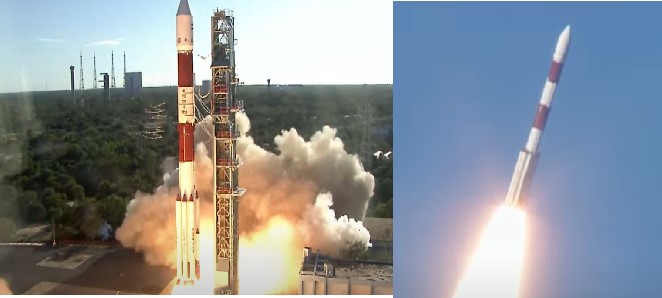
(Photo : ISRO Official You tube)
ISRO's Satellite Launches Boost India's Foreign Exchange
- India's space economy is projected to increase from $8.4 billion to $44 billion in the next decade, thanks to substantial investments.
- The Indian Space Research Organisation's (ISRO) Space Docking Experiment (SPADEX) mission has positioned India as a global leader in space docking technology.
- Collaboration between the Department of Biotechnology and ISRO aims to lead in 'Space-Biology' by studying physiological changes in space environments.
- The 2023 New Space Policy has led to a surge in space startups, reinforcing ISRO's infrastructure and attracting global attention.
India's space economy is on the brink of a significant surge, with projections indicating a nearly five-fold increase from $8.4 billion to around $44 billion in the next decade. This prediction comes from Union Minister of State for Science and Technology, Dr. Jitendra Singh, who attributes this growth to substantial investments in the sector. In 2023 alone, the sector received investments worth Rs 1,000 crore, positioning India as a global leader in the space industry.
The Indian space sector has also emerged as a significant foreign exchange earner. It has generated 220 million euros through launching foreign satellites, with 187 million euros of this revenue generated in the last eight years. Countries such as the US, France, and Japan have been the primary beneficiaries of ISRO 's services.
ISRO's SPADEX Mission: A Technological Marvel
Dr. Singh also highlighted the success of ISRO's Space Docking Experiment (SPADEX) mission, which has placed India on par with global leaders in space docking technology. The SPADEX mission is a pivotal project by ISRO aimed at developing and demonstrating technologies for spacecraft rendezvous, docking, and undocking using two small satellites. These capabilities are critical for future missions, including satellite servicing, space station operations, and interplanetary exploration.
The primary objectives of SPADEX include demonstrating technology for spacecraft rendezvous and docking, showcasing controllability in docked conditions to extend the life of target spacecraft, and testing power transfer between docked satellites. The mission also includes post-docking activities, with spacecraft conducting independent payload operations. The docking is expected to occur on January 7, 2025, at noon.
India's Space Sector: A Hub for Innovation and Collaboration
In addition to technological advancements, the minister also highlighted a significant collaboration between the Department of Biotechnology and ISRO to explore the application of biology in Space. Under Prime Minister Narendra Modi 's leadership, India aims to lead in 'Space-Biology' by studying physiological changes in space environments.
The 2023 New Space Policy has also played a crucial role in the growth of the space sector. It allowed private sector participation in ISRO's activities, leading to a surge in space startups, growing from a single-digit count in 2021 to nearly 300 in 2023. Notable startups include AgniKul Cosmos, which established a private launchpad on ISRO premises, and Skyroot, which executed India's first private sub-orbital launch. These startups are reinforcing ISRO's infrastructure and attracting global attention from companies like SpaceX.
* This is a contributed article and this content does not necessarily represent the views of btin.co.in









